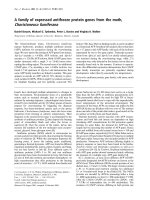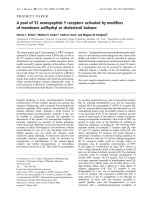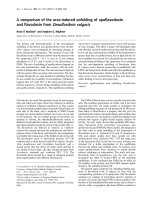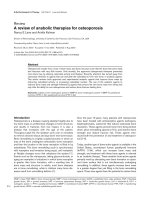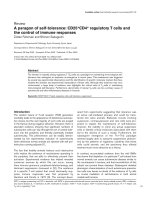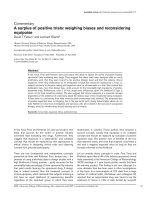Báo cáo y học: "A matter of life and death" pps
Bạn đang xem bản rút gọn của tài liệu. Xem và tải ngay bản đầy đủ của tài liệu tại đây (52.24 KB, 3 trang )
Genome Biology 2005, 6:109
comment
reviews
reports
deposited research
interactions
information
refereed research
Comment
A matter of life and death
Gregory A Petsko
Address: Rosenstiel Basic Medical Sciences Research Center, Brandeis University, Waltham, MA 02454-9110, USA.
E-mail:
Published: 28 April 2005
Genome Biology 2005, 6:109 (doi:10.1186/gb-2005-6-5-109)
The electronic version of this article is the complete one and can be
found online at />© 2005 BioMed Central Ltd
Terri Schiavo died at 9:05 on the morning of March 31,
2005. That’s what her death certificate says. Thirteen days
previously, at the request of her husband, Michael Schiavo,
who said he was carrying out her wishes, her doctors
removed the feeding tube that was keeping her alive.
Without food or water, she eventually succumbed to heart
failure at age 41. The death certificate doesn’t come close to
telling the real story of her death, however. Some people,
including her parents, siblings, and a number of religious
and political figures, would probably claim that, on that
morning, Terri Schiavo was murdered, either by her
husband or her doctors or both. Others think she should
have been allowed to die at least seven years earlier, when
her husband first requested it. And then there are those like
me, who believe that on the morning of March 31, 2005,
Terri Schiavo had already been dead for fifteen years.
Terri Schiavo (born Theresa Marie Schindler) was a young
married woman of 26 when she went into cardiac arrest,
possibly as a result of potassium imbalance brought on by an
eating disorder. When her heart stopped, she lost oxygen to
her brain for a considerable period of time before emergency
medical personnel were able to restart it. From that moment
on, Terri Schiavo never uttered a word, made a voluntary
conscious movement (she exhibited involuntary reflex
actions only), or responded to any external stimuli. Neurolo-
gists who examined her said she was in what they term a
“persistent vegetative state”, a condition that sounds as bad
as it is. Her electroencephalogram (EEG) was flat, indicative
of no higher cortical functions. A brain scan indicated that
essentially all of her neurons were dead - presumably from
apoptosis due to ischemia. Her brain stem still functioned,
though, and such is the persistence of the autonomic
nervous system that her lungs continued to work and her
heart continued to beat for fifteen years. But there was no
mind. Some years after she went into this condition her
husband lost hope and petitioned the Florida courts to allow
her feeding tube to be removed. The courts agreed, but her
parents, the Schindlers, who never lost hope that a miracle
could still happen, obtained an injunction preventing the
tube’s removal. The husband appealed. The appellate court
sided with him; the Schindlers sought another injunction,
and so on, back and forth year after year: a legal tug-of-war
with a brain-dead woman as the rope.
Something like this can bring out both the best and the worst
in human nature. The Schiavo case certainly did. For the
best one only has to look to the health-care workers at the
hospice who nursed the body of Terri Schiavo, gratis, for
over a decade. Or perhaps to Michael Schiavo - if, as he said,
his motivation was to carry out Terri Schiavo’s wishes that
her life not be prolonged artificially if something like this
ever happened to her. Some would also look to the
Schindlers, who, having convinced themselves that their
daughter’s condition might someday improve, did every-
thing they could to keep her alive. (In any case, I certainly
think one has to feel enormous pity for them. No parent
should ever have to bury a child. To lose one’s parents is the
way of the world, but to lose someone young like that is like
being cheated.)
As for the worst, sadly there are a number of contenders. The
radical right-to-lifers and religious fundamentalists who
intruded on what should have been a private family matter
would surely garner plenty of votes. They seem to crawl out
of the woodwork whenever a case like this can guarantee
them publicity. Shamelessly preying on the Schindlers’ grief
and hope, they turned the whole affair into a media circus,
with themselves as ringmasters.
But my vote for the conscienceless opportunism prize goes to
those Congressional politicians who, seeing a chance to cater
to their social conservative constituents, passed an ad hoc
law referring the Schindlers’ case to the Federal courts
(which normally have no jurisdiction in such matters) in a
display of pandering that hasn’t been seen since Pandarus
gave the activity a bad name. President Bush was also quick
to use the sorry situation for his own political display: he
could have signed the law at his Texas ranch, where he was
vacationing at the time, but instead flew back to Washington
so he could affix his signature in front of the maximum
number of television cameras. Worst of all were the Republi-
can leaders of the Senate and House of Representatives,
respectively Bill Frist and Tom DeLay. DeLay, currently
under investigation for several breaches of ethics (perhaps
that makes him an expert on the subject), led the fight in
Congress to take the Schiavo case to the Federal courts
(which, in the end, upheld the state court rulings in favor of
her husband) despite decades of legal precedents establish-
ing such cases as state matters. “The time will come,” he
said, “for the men responsible for this to answer for their
behavior. We will look at an arrogant, out-of-control, unac-
countable judiciary that have thumbed their nose at Con-
gress and the president.” (Congressman DeLay seems to
have overlooked the fact that thumbing their nose at Con-
gress and the president is exactly what the judiciary is sup-
posed to do - the US Founding Fathers called this the
separation of powers in the Constitution. Perhaps he ought
to try reading that document sometime.) And Bill Frist, an
MD who was a transplant surgeon before entering the
Senate, actually performed his own neurological examina-
tion by viewing a videotape of Terri Schiavo and then pro-
nouncing her condition not as bad as the experts had stated.
No neurologist would ever make a diagnosis without actually
examining the patient in person.
Many commentators expressed amazement that Congress
should have chosen to intervene in such a deeply personal
dispute, but that didn’t surprise me at all. Since many politi-
cians have been in a persistent vegetative state for decades it
seems only natural that they would identify with someone in
that condition. If so, they had company: one vocal group of
supporters for keeping Terri Schiavo alive were activists for
disabled persons. Some of them apparently feared that the
decision to let her die might be the first step down a slippery
slope, leading eventually to the ‘right to die’ becoming an
‘obligation to die’ for the severely disabled. But Terri Schiavo
wasn’t in a wheelchair, or blind. By any reasonable definition,
her condition was not a disability. To argue that this case had
anything to do with the rights of the disabled is to force it into
a mold it doesn’t fit. For me this illustrates one of the main
problems I have with activists in general: their frequent ten-
dency to distort reality, probably because they see everything
through the lens of their particular single issue.
You might wonder why I appear to dismiss the possibility
that the politicians were motivated by a sincere moral princi-
ple, namely a belief in the sanctity of human life. I do think
some of them, and many of their supporters, were - but the
evidence points against it in the case of many of them. For
me, the acid test for the presence of principles is a certain
moral consistency, because that indicates there is something
underpinning the decisions one makes. Moral cognitive dis-
sonance - the holding of two opposing positions at the same
time - strikes me as a pretty good basis for concluding that
opportunism is at work. Most Congressmen who voted for
Federal intervention in the Schiavo case were also staunch
supporters of the war in Iraq. Perhaps their respect for life
only includes Judao-Christian life. Yes, I do understand one
might argue that it is sometimes necessary to sacrifice some
lives to preserve many more. But most of these same politi-
cians are also strong supporters of capital punishment (the
death penalty), which has never been proven to save lives
and, in the US, disproportionally falls on the poor and the
black. Do we then conclude their respect for life is restricted
to white, Judao-Christian life from the middle class on up?
It has been suggested that the Schiavo case is one more piece
of evidence of the hijacking of the Republican Party by the
religious right. John Danforth, a former Senator and a mod-
erate Republican - now there’s a phrase that may be rapidly
becoming an oxymoron - argued just that in an opinion piece
in The New York Times. If so (and I have my doubts that this
really does constitute such evidence - not least because some
50 Democrats voted in favor of the DeLay-sponsored bill,
and many Roman Catholics, who are not knee-jerk social
conservatives, also supported Terri Schiavo’s parents), the
religious right may have overreached this time: opinion polls
indicate that almost 80% of Americans opposed Congress
getting involved in this case. Still, there’s little doubt that
social conservatism is on the rise in the US. Fueled in part by
a deep suspicion of scientific advances, especially in biology,
a significant number of Americans are expressing doubts
about the morality of abortion, stem-cell research, the cre-
ation of chimeric animals, and many of the anticipated fruits
of the genomics revolution. Evangelical Christians accounted
for over a quarter of George Bush’s vote in 2004, according
to John Green of the University of Akron, and if you include
doctrinaire Catholics, then religious conservatives made up
over 40% of his total. No administration can ignore such
supporters.
But for me, what is most striking about the Schiavo case is
that it once again shows the importance of framing the issues
properly. An enormous amount of energy, angst and verbiage
has gone into a debate about whether or not it is ‘right’ to end
the life of a patient who will never recover cognitive func-
tions. That shouldn’t be the issue here at all. Whether or not
Terri Schiavo (or any other persistently vegetative patient)
ought to have been allowed to die is completely beside the
point. The point is, she was dead to begin with.
Someone who will never be able to form a thought, respond
to the outside world, and initiate a voluntary movement
should never be considered alive by any reasonable defini-
tion of the word. But advances in medical technology have
allowed us to keep such a person’s heart beating for essen-
tially a normal life span. Our ability to sustain some of the
outward signs of life has rendered obsolete the legal system’s
definition of what it means to be alive. Since it is unlikely
109.2 Genome Biology 2005, Volume 6, Issue 5, Article 109 Petsko />Genome Biology 2005, 6:109
that this definition will change any time soon, it is incum-
bent on every individual to make clear exactly what he or she
considers being alive to mean.
Many have tried to do so, through the use of ‘living wills’ -
documents that set forth their wishes regarding the use of
extraordinary measures to sustain life should something
dreadful happen to them. Though such wills have no force in
statute, courts and hospitals often take them into account in
making judgments about treatment. But one lesson of the
Schiavo case is that such language may not be enough, espe-
cially in cases where family members, often motivated by
sincere efforts to do the best thing for their loved one, fail to
agree on what is that best thing. To increase the likelihood of
avoiding such conflicts, living wills need to designate a
healthcare proxy: someone who is empowered to speak on
behalf of the patient when he or she can no longer speak for
themselves. It’s a good idea for such a person to be as objec-
tive as possible, so a close relative might not always be the
best choice. Living wills should also spell out, in no uncertain
terms, under what conditions a person considers their life to
have ended.
Social conservatives have been energized by the Schiavo
case, and now seem poised to try to impose their moral
values on society through legislation. Our old friends Tom
DeLay and Bill Frist are in the vanguard of this movement.
“It is not a day we will forget,” said DeLay. “We will work as
hard as we can to stop this from happening [again].” Right-
wing religious groups have vowed to push for new laws
restricting when spouses or relatives can end life-sustaining
care for an incapacitated person, and for changes in the rules
of the Senate that will more easily allow the ruling Republi-
can Party to confirm conservative judicial appointments by
the president. Ten US states are also considering legislation
that would block termination of life-support measures,
unless all legal appeals are exhausted and there is written
consent from the patient (a living will).
Just because something is done in the name of God doesn’t
automatically free it from the possibility of being tyrannous.
The dictatorship of the self-anointed morally righteous is still
a dictatorship. On one point, however, social conservatives
and I agree: life is a thing of great value. In fact, it’s far too
valuable to allow it to be controlled by a bunch of sanctimo-
nious hypocrites. No one has the right to say what’s to be done
at the end of my life unless I give them that right. So as soon as
I finish this column I’ll be updating my living will to name a
healthcare proxy. I’m also going to specify under what condi-
tions I believe my life to be over - and that then I wish to be
treated accordingly: namely, make me as comfortable as pos-
sible and let me go. I will certainly stipulate that I should be
considered dead if I am diagnosed by reputable neurologists to
be in a persistent vegetative state. And I think I’ll add that I
should also be considered to be brain dead if I ever start acting
like the leadership of the US House and Senate.
comment
reviews
reports
deposited research
interactions
information
refereed research
Genome Biology 2005, Volume 6, Issue 5, Article 109 Petsko 109.3
Genome Biology 2005, 6:109

